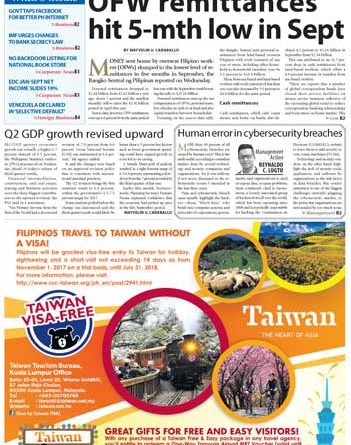Manila: OFW remittances hit 5-mth low in Sept
Money sent home by overseas Filipino workers (OFWs) slumped to the lowest level of remittances in five months in September, the Bangko Sentral ng Pilipinas reported on Wednesday.
Personal remittances dropped to $2.44 billion from $2.62 billion a year ago, down 7 percent and the smallest monthly inflow since the $2.31 billion posted in April this year.
Year to date, however, OFW remittances were up 4.8 percent from the same period last year with the September result boosting the tally to $23.16 billion.
Personal remittances sum up the net compensation of OFWs, personal transfers whether in cash or in kind and also capital transfers between households.
Focusing on the year-to-date tally, the Bangko Sentral said personal remittances from land-based overseas Filipinos with work contracts of one year or more, including other household-to-household transfers, rose by 5.1 percent to $18.4 billion.
Those from sea-based and land-based workers with work contracts of less than one year also increased by 3.5 percent to $4.8 billion for the same period.
Cash remittances
Cash remittances, which only count money sent home via banks, also declined 8.3 percent to $2.18 billion in September from $2.38 billion.
This was attributed to an 11.7-percent drop in cash remittances from land-based workers, which offset a 6.0-percent increase in transfers from sea-based workers.
“There are reports that a number of global correspondent banks have closed their service facilities on money service business, reflective of the increasing global trend to reduce correspondent banking relationships and focus more on home market. This may have partly affected remittances flows during the month,” the Bangko Sentral explained.
The BSP said the countries that registered the biggest declines in cash remittances in September were Saudi Arabia, Kuwait, Qatar, and Australia.
For Saudi Arabia, the decline in remittances could partly be the result of the continued repatriation of OFWs under the Saudi Arabian Amnesty Program that started in March 2017, it said,
The Saudi government extended the amnesty program anew on September 26, 2017 and a total of 8,467 undocumented Filipinos had already availed of the initial offer, according to the Department of Foreign Affairs.
For the first nine months of 2017, cash remittances recorded 3.8 percent growth from a year ago, reaching $20.78 billion.
Cash remittances from land-based and sea-based workers grew by 3.8 percent and 3.5 percent to reach $16.4 billion and $4.4 billion, respectively, the central bank said.
It added that cash remittances coming from the United States, Saudi Arabia, United Arab Emirates, Singapore, Japan, United Kingdom, Qatar, Kuwait, Germany and Hong Kong comprised about 72 percent of total cash remittances in the first nine months of 2017.
Growth driver
Despite the fall of remittances in September, analysts said it remained a key driver of economic growth.
“Supported by remittances, we expect tomorrow’s (today’s) third quarter GDP (gross domestic product) report to reveal private consumption remaining the main driver of GDP growth,” ING Bank senior economist Joey Cuyegkeng said.
Cuyegkeng said real household spending growth of close to 6 percent and GDP growth of 6.6 percent in the third quarter was expected.
DBS economist Gundy Cahyadi also said that strong remittances were behind consumption growth.
“For now, we continue to think that remittances are on track to hit $27 to $28 billion for the year,” he said.
Courtesy: Business Times | BY MAYVELIN U. CARABALLO, TMT ON
NOTE : All photographs, news, editorials, opinions, information, data, others have been taken from the Internet ..aseanews.net | [email protected] |
For comments, Email to :
Pahulu Gan – Contributor | [email protected]









